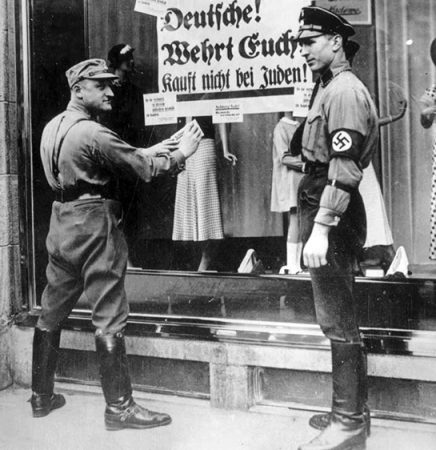
Victor Klemperer (1881-1960) was a German-Jewish professor and writer. The son of a rabbi, Klemperer was born in Prussia and educated in Munich, where he completed a doctorate in languages. He also converted to Christianity in order to marry Eva Schlemmer, a German piano teacher. Klemperer served as a volunteer in World War I before settling in Dresden, 120 miles south of Berlin.
The Klemperers remained in Dresden for the duration of the war. They survived Nazi interrogations, raids and deportations thanks to Victor Klemperer’s religious conversion and his wife’s Aryan status. They also survived the Allies’ devastating fire-bombing of the city in February 1945. Klemperer was a prolific diarist who kept a detailed chronicle of life in Dresden under the Nazis. In these extracts from 1933, he describes the anti-Jewish boycotts of April 1933, orchestrated by the Sturmabteilung (SA), and his fears that there was worse to come:
March 31st 1933
“The boycott begins tomorrow. Yellow placards, men on guard. Pressure [on Jewish employers] to pay Christian employees two months salary [and] to dismiss Jewish ones. No reply to the impressive letter of the Jews to the President of the Reich [Hindenburg] and to the government… No-one dares make a move.
The Dresden student body made a declaration today… the honour of German students forbids them to come into contact with Jews. They [Jews] are not allowed to enter the Student House. And how much Jewish money went toward this Student House only a few years ago? In Munich, Jewish university teachers have already been prevented from setting foot in the university.
The proclamation of the boycott committee decrees ‘Religious is immaterial’, only race matters. If, in the case of the owners of a business the husband is Jewish [and] the wife Christian or the other way around, then the business counts as Jewish…
On Tuesday, at the new Universum cinema on Prager-Strasse… Beside me, a soldier of the Reichswehr, a mere boy, and his not very attractive girl. It was the evening before the boycott. Conversation during an advertisement:
He: “One shouldn’t really go to a Jew to shop.”
She: “But it’s so terribly cheap.”
He: “Then it [the product] is bad and doesn’t last.”
She: “No, really, it’s just as good and lasts just as long, just like in Christian shops – and so much cheaper.”He falls silent. When Hitler, Hindenburg, etc. appeared [on the cinema newsreel], he clapped enthusiastically. Later, during the American jazz band film, with a touch of Yiddish at points, he clapped even more enthusiastically.”
April 3rd 1933
“On Saturday, red posters on the shops: ‘Recognised German-Christian Enterprise’. In between them, closed shops, SA men in front of them with triangular boards: ‘Whoever buys from the Jew supports the foreign boycott and destroys the German economy’.
People poured down Prater-Strasse and looked at it all. That was the boycott… Excluding banks, including doctors and lawyers. Called off after one day [but] it has been a success and Germany is magnanimous… I have the impression of a swiftly approaching catastrophe…”
April 7th 1933
“The pressure I am under is greater than during the war, and for the first time in my life, I feel political hatred for a group (as I did not during the war), a deadly hatred. In the war, I was subject to military law but subject to law nevertheless. Now I am at the mercy of an arbitrary power. Today, it changes, I am again less certain that the catastrophe will occur soon. Noone dares write a letter, no-one dares make a telephone call… no beast has fewer rights and is less hounded…”
